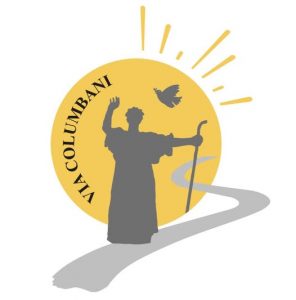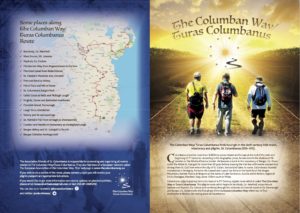
The Columban Way or Turas Columbanus is an integral part of the European Via San Columbani. It traces the journey of our Patron, St Columbanus, an Irish monk of the late 6th and early 7th century through Ireland, England, France, Switzerland, Germany, Austria, Liechtenstein and Italy, from his birthplace in the shadow of Mount Leinster on the Carlow-Wexford border to his resting place in Bobbio, south of Milan in Northern Italy.
While the route has been travelled by pilgrims dating back to early medieval times, in recent generations it has taken on a renewed momentum. Firstly in the aftermath of the World War II, when the then French Foreign Minister, Robert Schumann in a meeting in Luxeuil les Bains, France with Foreign Ministers spoke of Columbanus as the patron of all who aspired to a United Europe. And more recently in 2015 when we celebrated the 1,400th anniversary of the death of St Columbanus.
Turas Columbanus/The Columban Way is of particular interest to those who wish to keep the legacy of this great Irish “Man of Letters” and “First European” alive in the 21st century and thereby promote aspects of his life which are of significant interest to those who work towards an integrated Europe open to all.
It is a creative and inspirational project that invites peoples of all ages and backgrounds to put on their walking boots and take the time to connect with the beauty of the landscape, listen to the sound of nature and follow in the footsteps of the men and women who shaped this landscape and left their mark on it, be it in the ancient ruins, high crosses, holy wells, or just simply enjoying the landscape.
An important feature of Turas Columbanus is that it is a north-south pilgrim trail across the whole island of Ireland that brings communities of different faiths and cultural traditions together extending from Ireland’s Ancient East, through the counties of Wexford, Carlow, Kildare, Meath and Cavan to Cleenish Island in Co Fermanagh, Monaghan, Armagh and Strangford Lough, Nendrum and Bangor, Co Down.
The Columban Way/Turas Columbanus is much more than just walking a pilgrim path. Based on the writing and legacy of Columbanus, it is not the geographical destination that is the all-important goal but rather the journey itself, the engagement with communities both in Ireland and across Continental Europe, the building up of a community spirit along the route, the twinning of towns, the interaction among peoples through educational and cultural, sports projects, the caring for the environment and the coming together of likeminded academic people to explore the relevance of Columbanus for the Europe of the 21st century through studies and further research.

Who organises and promotes the Turas?
Here in Ireland Turas Columbanus/Columban Way is organised by the Association Friends of St Columbanus. The creation of the Association Friends of St Columbanus at the end of 2016 ensures that there is a group of dedicated people who are committed to the project and have their feet firmly on the ground. The organisation is currently made up of members of County Councils and tourist boards from counties Wexford, Carlow, Kildare, Meath, Cavan, Monaghan, Ards & North Down; local community groups and organizations such as Muintir na Tire, Myshall; Knights of St Columbanus; Columban Fathers and Sisters.
The secretariat is based in Dalgan Park, Navan. For further information, please email [email protected]
Useful Links:
Facebook: https://www.facebook.com/turascolumbanus
Via Columbani https://viacolumbani.com/?categories=T4
Friends of Columbanus Bangor https://friendsofcolumbanusbangor.co.uk
Les Amis de St Colomban Luxeuil https://www.amisaintcolomban.org
L’association « Saint Colomban en Brie » https://asu77ussy.fr/index.php/monuments-patrimoine/lassociation-saint-colomban-en-brie/
Kolumbanweg, Friends of Columban, Switzerland https://www.kolumbansweg.ch
Associazione Amici di San Colombano di Bobbio, Italy https://www.facebook.com/AmiciSanColombano/
Les Amis Breton de Colomban di St Coulomb, Brittany https://www.lesamisbretonsdecolomban.fr
